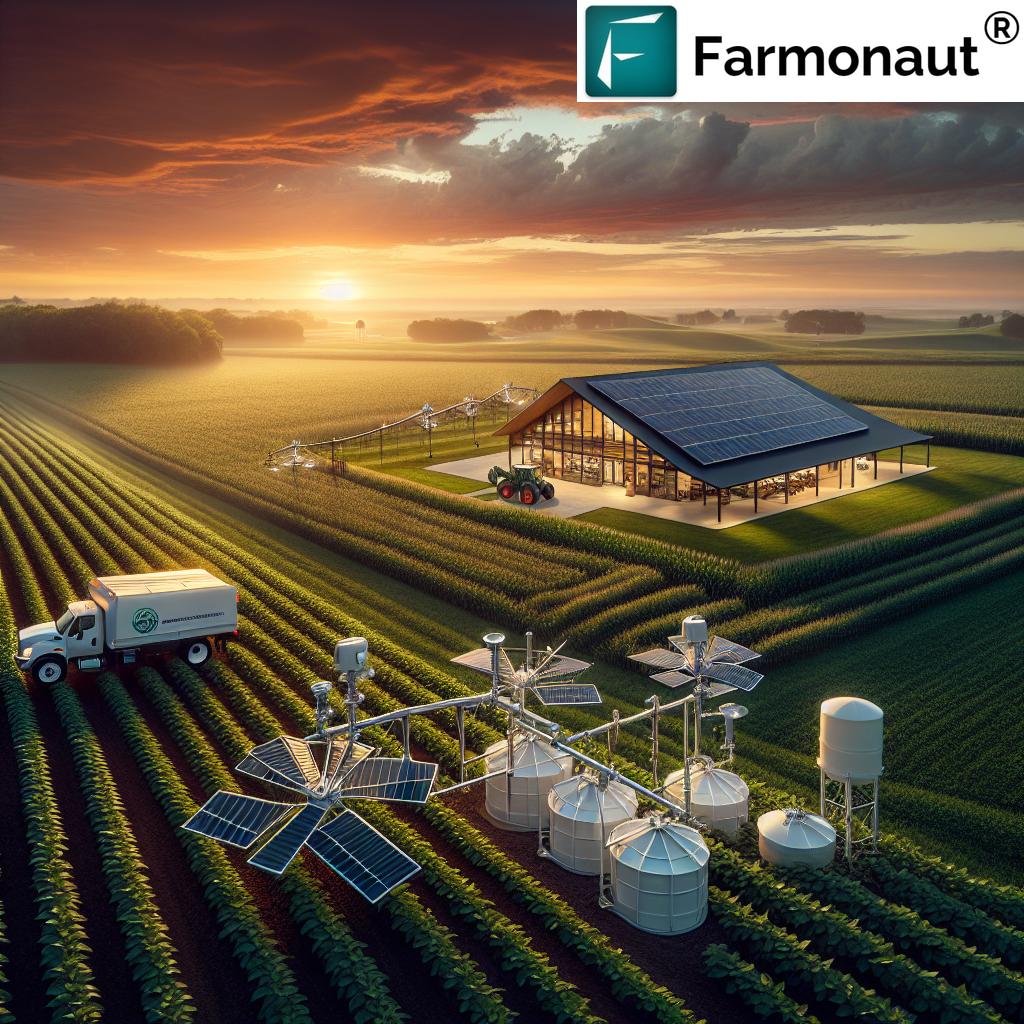Illinois Agriculture Revolution: How Climate-Smart Farming Is Reshaping the State’s Economy
“Illinois’ climate-smart agriculture initiatives aim to address unemployment rates and boost infrastructure investment across the state.”
In the heartland of America, a quiet revolution is taking place. The state of Illinois, long known for its vast cornfields and soybean plantations, is now at the forefront of a transformative movement in agriculture. This movement, centered around climate-smart farming practices, is not just changing the way crops are grown; it’s reshaping the entire economic landscape of the Prairie State. As we delve into this fascinating transition, we’ll explore how the Illinois state government, in conjunction with innovative farmers and cutting-edge technology, is paving the way for a more sustainable and prosperous future.
The Rise of Climate-Smart Agriculture in Illinois
Climate-smart agriculture has become more than just a buzzword in Illinois; it’s a comprehensive approach to farming that addresses the triple challenge of increasing productivity, adapting to climate change, and reducing greenhouse gas emissions. The state government has recognized the potential of these practices not only to improve agricultural output but also to stimulate economic growth and create jobs.

Here are some key initiatives that are driving this agricultural revolution:
- Precision Agriculture Adoption: Illinois farmers are increasingly using GPS-guided tractors, drones, and satellite imagery to optimize planting, fertilization, and harvesting. This technology-driven approach reduces waste and increases yields.
- Sustainable Water Management: With changing rainfall patterns, efficient irrigation systems and water conservation techniques are being implemented across the state.
- Carbon Sequestration Projects: Farmers are adopting practices like no-till farming and cover cropping to increase soil carbon storage, improving soil health while combating climate change.
- Renewable Energy Integration: Solar panels and wind turbines are becoming common sights on Illinois farms, reducing energy costs and providing additional income streams for farmers.
These initiatives are not just improving farm productivity; they’re creating new jobs in technology, data analysis, and environmental science. The local farm economy is diversifying, with new opportunities emerging in areas like agtech startups and sustainable agriculture consulting.
Government Support and Policy Initiatives
The success of climate-smart agriculture in Illinois owes much to the proactive stance of the state government. Governor JB Pritzker has made it a priority to support these innovative farming practices through a combination of policy initiatives and financial incentives.
“Illinois’ progressive farming policies are influencing agricultural strategies in other states like Michigan and Colorado, reshaping Democratic party influence.”
Some of the key government actions include:
- Illinois Infrastructure Investment: The “Rebuild Illinois” campaign, launched in 2024, has allocated significant funds to modernize rural infrastructure, including improving broadband access for precision agriculture.
- Tax Incentives: Farmers adopting climate-smart practices are eligible for tax breaks, encouraging wider adoption of these methods.
- Research Funding: The state has increased funding for agricultural research at universities, focusing on developing climate-resilient crop varieties and sustainable farming techniques.
- Workforce Development: New programs at community colleges are training the next generation of tech-savvy farmers and agricultural technicians.
These policies are not only boosting the agricultural sector but also addressing broader economic challenges. The state unemployment rate, which has been a concern, is showing signs of improvement as new job opportunities emerge in the evolving agricultural landscape.
Economic Impact and Future Projections
The shift towards climate-smart agriculture is having a profound impact on Illinois’ economy. Early estimates suggest that these initiatives could lead to:
- A 15% increase in agricultural productivity over the next decade
- Creation of 50,000 new jobs in agriculture and related sectors
- A 20% reduction in agricultural water use
- Significant increase in farm incomes due to reduced input costs and new revenue streams
Moreover, these changes are positioning Illinois as a leader in sustainable agriculture, attracting investment from both national and international sources. Companies specializing in agricultural technology are setting up operations in the state, further diversifying the economy.
For farmers looking to leverage technology in their climate-smart farming practices, solutions like Farmonaut’s crop plantation and forest advisory services can provide valuable insights. These tools use satellite imagery and AI to help farmers make data-driven decisions, aligning perfectly with Illinois’ push for precision agriculture.
Challenges and Opportunities
While the outlook is largely positive, the transition to climate-smart agriculture is not without its challenges. Some of these include:
- Initial Investment Costs: Many farmers face financial barriers in adopting new technologies and practices.
- Education and Training: There’s a need for extensive education programs to help farmers transition to new methods.
- Policy Consistency: Ensuring long-term support and consistent policies across changing administrations is crucial.
- Market Adaptation: Developing markets for new crops and products that emerge from climate-smart practices.
However, these challenges also present opportunities. The state is working on innovative financing models to help farmers overcome initial costs. Educational institutions are expanding their agricultural programs to meet the growing demand for skilled professionals in this field.
The Broader Impact: Beyond Illinois
The success of Illinois’ climate-smart agriculture initiatives is not going unnoticed. Other states, particularly in the Midwest, are closely watching and beginning to adopt similar approaches. This is creating a ripple effect that could transform American agriculture as a whole.
Moreover, Illinois’ experience is providing valuable lessons for addressing climate change in agriculture globally. The state’s initiatives align with international efforts to create more resilient and sustainable food systems, positioning Illinois as a potential model for other regions around the world.

The Role of Technology in Climate-Smart Agriculture
Technology plays a crucial role in enabling and enhancing climate-smart agricultural practices. From satellite imagery to AI-powered analytics, farmers now have access to tools that were unimaginable just a few decades ago. Companies like Farmonaut are at the forefront of this technological revolution, offering solutions that align perfectly with Illinois’ agricultural goals.
For instance, Farmonaut’s carbon footprinting tools can help Illinois farmers track and reduce their environmental impact, contributing to the state’s sustainability goals. Similarly, their fleet management solutions can optimize farm operations, reducing costs and emissions.
Policy Implications and Political Landscape
The success of climate-smart agriculture in Illinois is reshaping the political landscape, not just within the state but across the nation. Governor Pritzker’s focus on these initiatives is part of a broader strategy by Democratic governors to rebuild their party’s influence in rural America.
Key policy implications include:
- Minimum Wage Increases: The success of the Illinois minimum wage increase to $15 is being studied by other states as a potential model.
- Education Reform: Efforts to allow community college four-year degrees in agricultural technology and management are gaining traction.
- Constitutional Challenges: The state is navigating complex legal terrain as it implements progressive agricultural policies.
- International Relations: Illinois is forging connections with countries like Germany and Ukraine, sharing knowledge and technology in sustainable agriculture.
These policies are not just reshaping agriculture; they’re influencing the broader political discourse on climate change, rural development, and economic policy.
Comparative Analysis: Climate-Smart Agriculture Initiatives in Illinois
| Initiative Name | Description | Economic Impact | Alignment with National Policy |
|---|---|---|---|
| Precision Agriculture Adoption | Implementation of GPS-guided machinery, drones, and satellite imagery for optimized farming | 20% increase in crop yields, $500 million annual revenue boost | Aligns with USDA’s focus on technology-driven agriculture |
| Sustainable Water Management | Advanced irrigation systems and water conservation techniques | 30% reduction in water usage, $200 million savings in water costs | Supports national water conservation goals |
| Carbon Sequestration Projects | No-till farming and cover cropping to increase soil carbon storage | 5,000 new green jobs, $300 million in carbon credits | Contributes to U.S. carbon reduction commitments |
| Renewable Energy Integration | Solar and wind energy adoption on farms | 10,000 new jobs in renewable sector, $1 billion in energy savings | Supports national clean energy transition goals |
The Future of Farming in Illinois
As we look to the future, it’s clear that the agricultural revolution in Illinois is just beginning. The state is poised to become a global leader in sustainable, high-tech farming. This transformation will likely involve:
- Increased Automation: More farms will adopt autonomous tractors and harvesting robots, increasing efficiency and reducing labor costs.
- AI-Driven Decision Making: Artificial intelligence will play a larger role in farm management, from predicting weather patterns to optimizing crop rotations.
- Vertical Farming: Urban areas in Illinois may see a rise in vertical farms, bringing fresh produce closer to consumers and reducing transportation emissions.
- Biotechnology Advancements: Development of more resilient and nutritious crop varieties tailored to Illinois’ changing climate.
These advancements will not only enhance agricultural productivity but also create new job opportunities in fields like data science, robotics, and biotechnology, further diversifying the state’s economy.
Conclusion: A Model for Sustainable Agriculture
The agricultural revolution unfolding in Illinois represents more than just a change in farming practices; it’s a comprehensive reimagining of the relationship between agriculture, technology, and the environment. By embracing climate-smart agriculture, Illinois is not only addressing the challenges of climate change but also creating a more resilient and prosperous economy.
As other states and countries look to Illinois as a model, the impact of these initiatives extends far beyond the state’s borders. The success of Illinois in this endeavor could well be a blueprint for global agricultural sustainability in the 21st century.
For those interested in being part of this agricultural revolution, tools like Farmonaut offer an accessible entry point. Whether you’re a farmer looking to optimize your operations or an investor interested in the future of agriculture, the opportunities in Illinois’ evolving agricultural landscape are both exciting and promising.
FAQ Section
- What is climate-smart agriculture?
Climate-smart agriculture is an approach that helps guide actions to transform agricultural systems to effectively support development and ensure food security in a changing climate. It aims to tackle three main objectives: sustainably increasing agricultural productivity and incomes, adapting and building resilience to climate change, and reducing greenhouse gas emissions where possible. - How is Illinois implementing climate-smart agriculture?
Illinois is implementing climate-smart agriculture through various initiatives including precision farming techniques, sustainable water management, carbon sequestration projects, and integrating renewable energy in farming operations. The state government is supporting these efforts through policy initiatives, financial incentives, and research funding. - What economic benefits does climate-smart agriculture bring to Illinois?
Climate-smart agriculture is bringing numerous economic benefits to Illinois, including increased agricultural productivity, creation of new jobs in agriculture and related sectors, reduced input costs for farmers, and new revenue streams from practices like renewable energy generation on farms. - How is technology contributing to this agricultural revolution?
Technology plays a crucial role in enabling climate-smart agriculture. Tools like GPS-guided machinery, drones, satellite imagery, and AI-powered analytics are helping farmers optimize their operations, reduce waste, and increase yields. Companies like Farmonaut are providing farmers with advanced tools for crop monitoring and management. - What challenges does Illinois face in transitioning to climate-smart agriculture?
Some challenges include the initial investment costs for new technologies and practices, the need for extensive education and training programs, ensuring policy consistency across changing administrations, and adapting markets for new crops and products that emerge from climate-smart practices.
Earn With Farmonaut
Earn 20% recurring commission with Farmonaut’s affiliate program by sharing your promo code and helping farmers save 10%. Onboard 10 Elite farmers monthly to earn a minimum of $148,000 annually—start now and grow your income!
Access Farmonaut’s Solutions
Explore Farmonaut’s innovative agricultural solutions:
For developers interested in integrating Farmonaut’s technology into their own applications, check out our API and API Developer Docs.






